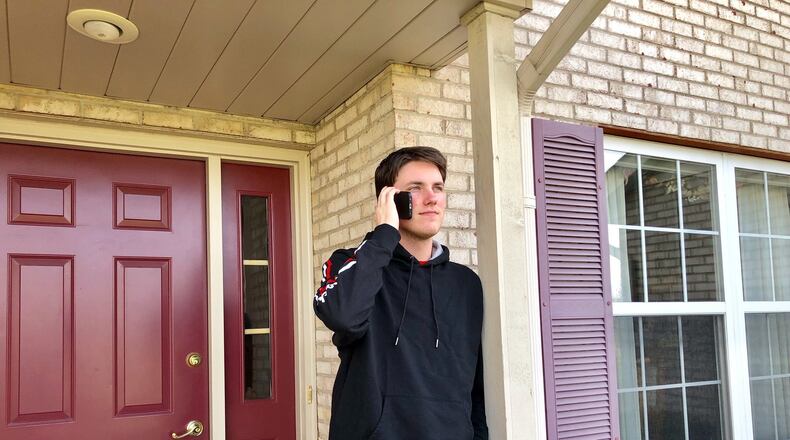Participating teens said communicating remotely during school shutdowns by phone calls, text and other digital means is difficult but doable.
Nick Parr is a Lakota East High School senior who was one of the original members two years ago of Lakota’s “Hope Squads,” which are local chapters of a nationwide, teen suicide prevention program designed for youth to help their classmates while being overseen by teacher advisors in each school.
Where Parr used to monitor for classmates suffering from depression and anxiety, he now does it while in home isolation through his digital and phone network of contacts.
The historic disruption for thousands of local students of their daily school routines – combined with living under virus isolation rules – has increased the need for students staying in touch with students, he said.
“We have definitely amplified our reaching-out efforts. Now we are getting phone and text tips from other students saying we might want to reach out to someone,” Parr said..
“A lot of students are more confused than scared. Boredom is a big problem too. They (students) are upset and they want to go school and see the people they saw everyday and do the things they used to do.”
Student participants in Hope Squads and other teen suicide prevention programs – do not act as mental health counselors but rather as communication conduits who listen and then steer needy classmates to the proper in-school adults or community mental health programs that partner with the school programs.
Lakota West High School Hope Squad Advisor Katie Nicol said the severe limitations brought on by isolation makes the task tougher.
“We would much rather see our Hope Squad members face-to-face, but we are making it work via remotely. During this crisis, our district’s Hope Squads – East and West - are working to spread positivity via social media to uplift not only their peers but also our community,” said Nicol.
Betsy Fuller, spokeswoman for Lakota Schools, said the goal is no disruption in letting troubled students know they aren’t alone – even when living under isolation.
“We know that the COVID-19 crisis and stay at home order is stressful for our families and we continue to support our students during the closure. We recognize the importance of consistent care and our mental health therapists continue to meet with students virtually,” said Fuller.
“Lakota’s school counselors are also monitoring emails to provide support and reaching out to our families in need, while sharing coping strategies through social media.”
Tracey Carson, spokeswoman for the Warren County’s Mason Schools, said whether in-person or via remote communications, Hope Squad students remain key players.
“Our Hope Squad saves lives,” Carson said. “During our time physically away from each other, they have not stopped looking for signs of students hurting, and getting them help. Our Safe Schools Tip Line is the most utilized in the region, and a good deal of our tips come from Hope Squad members who are always vigilant in looking out for their classmates.
“We have continued to receive tips during this time, and have made sure that students at risk of self-harm or suicide have well-checks and support.”
Mason High School senior Anna Attal said the remote work can be daunting at times.
“It is hard to detect when students are struggling when you are not physically with them during the school day, but that is where reaching out to people is so crucial. Checking in on friends gives them an opportunity to share how they are feeling and find some companionship in the experience,” said Attal.
“This time of confusion and social distancing has been hard for many of my peers, and I have heard various complaints and uncertainties. As Hope Squad members, it is our role to listen to our peers and give them an outlet to express the emotions they are having. I have been trying to remain optimistic throughout this process and share that optimism with others, and it seems to be helping,” she said.
About the Author
